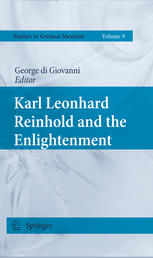

Most ebook files are in PDF format, so you can easily read them using various software such as Foxit Reader or directly on the Google Chrome browser.
Some ebook files are released by publishers in other formats such as .awz, .mobi, .epub, .fb2, etc. You may need to install specific software to read these formats on mobile/PC, such as Calibre.
Please read the tutorial at this link: https://ebookbell.com/faq
We offer FREE conversion to the popular formats you request; however, this may take some time. Therefore, right after payment, please email us, and we will try to provide the service as quickly as possible.
For some exceptional file formats or broken links (if any), please refrain from opening any disputes. Instead, email us first, and we will try to assist within a maximum of 6 hours.
EbookBell Team

0.0
0 reviewsKarl Leonhard Reinhold (1757-1823) is a complex figure of the late German Enlightenment. Sometime Catholic priest and active Mason even when still a cleric in Vienna; early disciple of Kant and the first to try to reform the Critique of Reason; influential teacher and prolific author; astute commentator on the immediate post-Kantian scene; and at all times convinced propagandist of the Enlightenment––in all these roles Reinhold reflected his age but also tested the limits of the values that had inspired it. This collection of essays, originally presented at an international workshop held in Montreal in 2007, conveys this multifaceted figure of Reinhold in all its details. In the four themes that run across the contributions––the historicity of reason; the primacy of moral praxis; the personalism of religious belief; and the transformation of classical metaphysics into phenomenology of mind––Reinhold is presented as a catalyst of nineteenth century thought but also as one who remained bound to intellectual prejudices that were typical of the Enlightenment and, for this reason, as still the representative of a past age. The volume contains the text of two hitherto unpublished Masonic speeches by Reinhold, and a description of recently recovered transcripts of student lecture notes dating to Reinhold’s early Jena period.